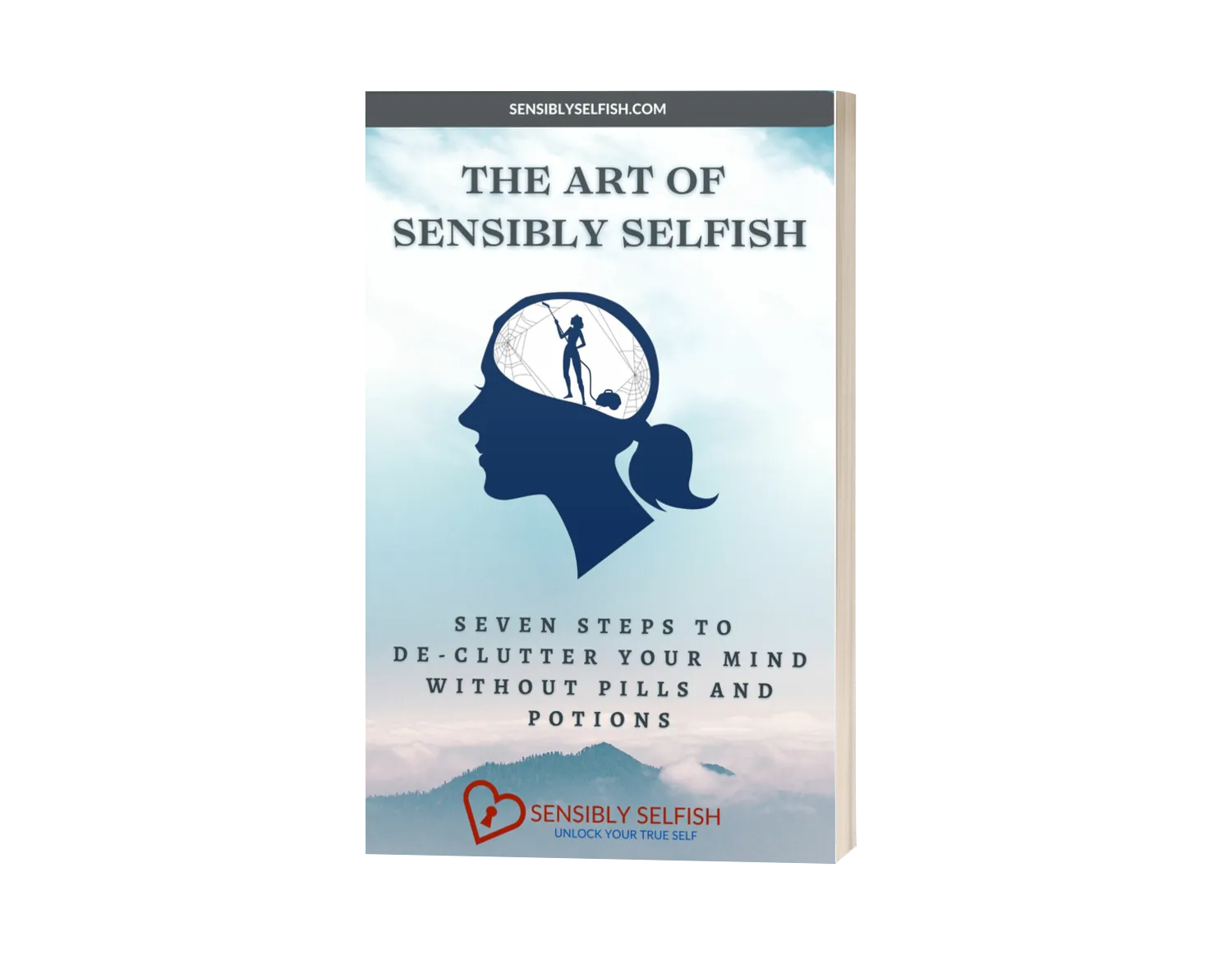Selfishness with Purpose: Unraveling the Concept of Sensibly Selfish
Welcome to "Selfishness with Purpose: Unraveling the Concept of Sensibly Selfish." In this blog post, we embark on a journey of understanding and embracing the essence of being Sensibly Selfish. Far from the negative connotations often associated with selfishness, we explore how being sensibly selfish can bring balance, empowerment, and fulfillment to women over 45.

In a world that often demands our selflessness and sacrifice, it's time to pause and recognize the importance of prioritizing our own well-being. Sensibly selfishness is a mindset that encourages us to take care of ourselves while considering the impact on others, making rational choices, and finding harmony between self-care and the needs of those around us.
Join us as we delve into the art of sensibly selfishness, unraveling its layers and uncovering its transformative power. Discover how embracing this concept can lead to personal growth, nurturing relationships, and a renewed sense of purpose in your life.
Throughout this journey, we will explore practical strategies for setting boundaries, making informed decisions, and cultivating self-awareness. We will also discuss the balance between self-care and attending to the needs of others, navigating conflicting interests, and finding win-win solutions.
Let go of the guilt and misconceptions surrounding selfishness, and embrace a new perspective that values your well-being without disregarding the importance of empathy and healthy relationships. It's time to redefine selfishness with purpose, empowering ourselves to live more fulfilling lives and make a positive impact on those around us.
Get ready to unlock the power of sensibly selfishness and embark on a path of self-discovery, growth, and empowerment. Let's dive in and explore the incredible possibilities that await as we embrace selfishness with purpose.
[ToC]
Prioritizing Your Well-being
In the midst of our busy lives, it's easy to lose sight of our own well-being. Women over 45 often find themselves juggling multiple roles and responsibilities, leaving little time and energy for self-care. However, it's crucial to recognize that prioritizing your well-being is not a luxury but a necessity for leading a fulfilling life.
- Imagine this scenario: Meet Sarah, a vibrant and accomplished woman in her late 40s. Sarah has always been the go-to person for her family and friends. She constantly puts others' needs before her own, taking on extra tasks at work, attending to her children's demands, and supporting her aging parents. Over time, Sarah's energy dwindles, and she begins to feel depleted, both physically and emotionally.
One day, Sarah realizes that she can no longer continue neglecting her own well-being. She makes a conscious decision to prioritize self-care, recognizing that taking care of herself is essential for her overall happiness, health, and success. Sarah starts incorporating small but meaningful actions into her daily routine.
She sets aside 30 minutes each morning to engage in gentle exercise and mindfulness practices. This dedicated time allows her to center herself, find inner peace, and connect with her own needs before diving into the demands of the day. Through this simple act of prioritizing her well-being, Sarah experiences increased energy, mental clarity, and a renewed sense of purpose.
Sarah also understands the importance of boundaries. She learns to say no to additional commitments that don't align with her personal goals and values, allowing herself more time to relax, pursue her passions, and engage in activities that bring her joy. By setting these boundaries, Sarah reclaims control over her time and energy, resulting in reduced stress and an improved sense of balance in her life.
By prioritizing her well-being, Sarah becomes an inspiration to those around her. She not only feels happier and more fulfilled but also shows up as a better version of herself in her relationships and responsibilities. Through her newfound self-care practices, Sarah is able to support her loved ones more effectively while also honoring her own needs and aspirations.
Sarah's example demonstrates that prioritizing your well-being is not selfish; it's a vital aspect of leading a fulfilling life. By investing in self-care, setting boundaries, and making deliberate choices that align with your personal goals and values, you create a solid foundation for overall well-being and success.

Examples To Others
Additionally, prioritizing your well-being goes beyond the immediate benefits it brings. It also sets a powerful example for those around you, especially younger generations. By demonstrating the importance of self-care and making yourself a priority, you break the cycle of self-neglect that may have been ingrained in societal expectations.
When you prioritize your well-being, you give others permission to do the same. You become a role model for your children, showing them the significance of self-care and the value of setting healthy boundaries. By nurturing yourself, you teach them the invaluable lesson that self-love and self-respect are not selfish acts but essential components of a balanced and fulfilling life.
Furthermore, when you prioritize your well-being, you become more resilient and better equipped to handle life's challenges. By regularly refilling your own cup, you have more to give to others without feeling depleted or resentful. You bring your best self to the table, and your relationships thrive as a result.
Self-care is not a one-time event or a sporadic indulgence. It is a continuous commitment to your well-being. It requires consistency and dedication, but the rewards are immeasurable. When you prioritize your well-being, you create a solid foundation for overall health, happiness, and success.
Take a moment to reflect on your own well-being.
- Are you giving yourself the attention and care you deserve?
- Are you setting boundaries and making choices that honor your needs and aspirations?
Embrace the power of prioritizing your well-being and start cultivating a life that flourishes from a place of self-nurturing. You owe it to yourself and those around you to thrive, and it all begins with making yourself a priority.
[CTA]
Setting Boundaries
In our desire to be caring and accommodating, many women over 45 often find themselves stretched thin, constantly saying yes to the demands and requests of others. However, it's essential to recognize that setting boundaries is a crucial aspect of self-care and personal empowerment. By establishing clear boundaries, you honor your needs, protect your well-being, and create healthier and more balanced relationships.
Consider the story of Laura, a compassionate and dedicated woman in her 50s. Laura has always been the go-to person for her friends and family. She would drop everything to help others, often at the expense of her own well-being. Over time, Laura began to feel overwhelmed, exhausted, and resentful. She realized that she needed to make a change.
Laura started by reflecting on her own values, priorities, and limitations. She acknowledged that saying yes to everything was unsustainable and was negatively impacting her physical and mental health. Determined to take control of her life, Laura decided to set boundaries to protect her time, energy, and emotional well-being.
- For example, Laura had a close friend who frequently relied on her for support, often at inconvenient times. Laura realized that she needed to establish boundaries in their relationship. She had an open and honest conversation with her friend, explaining her need for balance and the importance of her own well-being. Laura expressed that while she valued their friendship, she couldn't be available at all times. Together, they explored alternative ways for her friend to seek support, such as joining a support group or seeking professional assistance.
By setting this boundary, Laura not only preserved her own energy but also encouraged her friend to develop independence and explore other avenues of support. Over time, Laura's relationships became healthier and more balanced as she learned to prioritize her own well-being without sacrificing her connection with others.
Are Boundaries Selfish?
Setting boundaries is not about being selfish or uncaring; it's about establishing a framework that allows you to show up as your best self while still being available to others in a sustainable way. It involves clearly communicating your needs, limits, and expectations to those around you.
When you set boundaries, you reclaim your time and energy for activities that nurture your own well-being. You create space for self-care, personal growth, and pursuing your passions. By doing so, you become a happier, more fulfilled individual, which positively impacts all aspects of your life.
Setting boundaries is an ongoing practice that requires self-awareness, assertiveness, and consistency. Start by identifying areas of your life where boundaries may be necessary, whether it's in relationships, work, or personal commitments. Communicate your boundaries kindly but firmly, and be prepared to reinforce them when necessary.
As you establish and maintain boundaries, you empower yourself and send a powerful message to others that your well-being matters. Embrace the transformative power of setting boundaries and witness how it cultivates respect, balance, and authenticity in your relationships and ultimately leads to a more fulfilling and harmonious life.

In addition to empowering yourself and honoring your needs, setting boundaries has a ripple effect that extends beyond your immediate well-being. By setting boundaries, you teach others how to treat you and establish healthier dynamics in your relationships.
Recap
A great way to use the list below is to have a journal or pen and paper as you read. When you connect your head and heart through your hand you are able to create a working way forward.
- Reflect on Your Needs: Take time to identify your personal needs, values, and limits. Understand what is important to you and what you require to maintain your well-being.
- Define Your Boundaries: Clearly articulate your boundaries by setting specific limits and expectations in various areas of your life, such as relationships, work, and personal commitments.
- Communicate Assertively: Practice assertive communication when expressing your boundaries to others. Be direct, firm, and respectful in conveying your needs and limits.
- Practice Saying No: Learn to say no without guilt or apology when a request or situation does not align with your boundaries or priorities. Remember that saying no is a valid and necessary response.
- Reinforce Boundaries: Be consistent in upholding your boundaries. Stand firm and do not compromise on what you have defined as important for your well-being.
- Seek Support: Surround yourself with a supportive network of friends, family, or professionals who understand and respect your boundaries. Seek guidance and encouragement when needed.
- Practice Self-Care: Prioritize self-care activities that nourish your physical, emotional, and mental well-being. Set aside dedicated time for relaxation, hobbies, and activities that bring you joy and fulfillment.
- Monitor Your Feelings: Pay attention to your emotions and energy levels. If you start feeling overwhelmed, stressed, or resentful, it may be a sign that you need to reinforce your boundaries or reassess your commitments.
- Practice Self-Compassion: Be kind to yourself throughout this process. Setting boundaries can be challenging, but remember that you are taking steps to prioritize your well-being and create a healthier life for yourself.
- Evaluate and Adjust: Regularly review and evaluate your boundaries. As circumstances change, your needs and limits may evolve. Be open to adjusting your boundaries to ensure they continue to serve your well-being.
By taking action and implementing these steps, you will gradually establish a foundation of boundaries that support your well-being and empower you to lead a more fulfilling life. Remember, setting boundaries is a continuous practice, and each step you take brings you closer to a life that honors your needs and allows you to thrive.
[CTA]
Making Rational Choices
In a world filled with endless options and competing demands, making rational choices becomes paramount, especially for women over 45 who are navigating diverse responsibilities and goals. By adopting a mindset of rational decision-making, you empower yourself to make choices that align with your values, priorities, and long-term well-being.
- Consider the story of Lisa, a vibrant and driven woman in her 50s. Lisa found herself constantly torn between various commitments, often feeling overwhelmed and unsure of which path to choose. She realized that making impulsive or emotionally driven decisions was leaving her feeling unsatisfied and unfulfilled.
- Determined to take charge of her life, Lisa decided to embrace rational decision-making. She embarked on a process of thoughtful evaluation and analysis when faced with choices, employing these key principles:
- Define Your Goals: Begin by clarifying your overarching goals and aspirations. What do you want to achieve in your personal and professional life? Understanding your desired outcomes provides a guiding framework for decision-making.
- Gather Information: Seek out relevant and reliable information related to the choices you need to make. Conduct research, consult experts, and gather insights from trusted sources. This information equips you with a solid foundation upon which to base your decisions.
- Assess Pros and Cons: List the potential benefits and drawbacks of each choice. Evaluate the potential risks, rewards, and consequences associated with each option. This analysis helps you weigh the different factors and make more informed choices.
- Consider Long-Term Impact: Look beyond immediate gratification and consider the long-term impact of your decisions. How will they align with your values, goals, and overall well-being? Opt for choices that contribute to your personal growth, happiness, and fulfillment over the long haul.
- Trust Your Intuition: While rational decision-making involves logical analysis, it's important to listen to your intuition as well. Intuition can be a valuable guide when all the logical factors align, but something deep within you urges you toward a particular choice. Trusting your gut can lead to authentic and fulfilling decisions.
- Embrace Flexibility: Recognize that life is dynamic, and circumstances may change. Be open to adapting your decisions as new information emerges or as your goals and priorities evolve. Flexibility allows for continued growth and adjustment along your journey.
By integrating these principles into her decision-making process, Lisa experienced a profound transformation. She found herself making choices that resonated with her core values and contributed to her overall well-being. Instead of feeling overwhelmed, she felt empowered and in control of her life's trajectory.

Making rational choices is not about eliminating emotions or intuition; rather, it involves finding a balance between logic and intuition, ensuring that decisions are grounded in thoughtful analysis and aligned with your deepest desires and aspirations.
As you embrace the practice of making rational choices, you will navigate life's complexities with greater clarity and confidence. You will make decisions that honor your authentic self, support your goals, and lead you towards a more fulfilling and purposeful life.
Take time to pause, reflect, and consciously choose to engage in rational decision-making. Empower yourself to navigate the myriad choices before you, and watch as each decision becomes a stepping stone towards a life that truly reflects who you are and what you desire.
[CTA]
Balancing Self-Care and Others' Needs
For women over 45, finding the delicate balance between self-care and attending to the needs of others can be a constant juggling act. You have responsibilities as a partner, parent, friend, and professional, among many other roles. However, it's vital to recognize that prioritizing self-care is not selfish; it is an essential component of maintaining overall well-being and effectively caring for others.
Imagine being on an airplane during an emergency. The flight attendants always instruct you to secure your own oxygen mask before assisting others. Why? Because you won't be able to help anyone if you are struggling to breathe yourself. The same principle applies to life outside the aircraft. By taking care of yourself, you are better equipped to care for those around you.
Strategies
Balancing self-care and others' needs requires a thoughtful and intentional approach. Here are some strategies to help you navigate this delicate equilibrium:
- Cultivate Self-Awareness: Take time to understand your own needs, limits, and priorities. Reflect on what brings you joy, relaxation, and fulfillment. This self-awareness forms the foundation for creating a sustainable self-care practice.
- Prioritize Self-Care: Make self-care a non-negotiable part of your routine. Carve out dedicated time for activities that recharge and nourish you, whether it's practicing mindfulness, engaging in physical exercise, pursuing hobbies, or simply taking moments of quiet solitude. Treat self-care as a vital appointment with yourself.
- Communicate Openly: Foster open and honest communication with the important people in your life. Express your needs and limitations with clarity and compassion. Let them know that while you care deeply for their well-being, you also need to prioritize self-care to show up as your best self.
- Set Boundaries: Establish clear boundaries to protect your time, energy, and well-being. Learn to say no when necessary and be selective in how you allocate your resources. Setting boundaries allows you to strike a healthy balance between meeting others' needs and preserving your own reserves.
- Delegate and Seek Support: Recognize that you don't have to do everything alone. Delegate tasks, seek support from family or friends, or consider hiring assistance when needed. Remember, asking for help is a sign of strength, not weakness.
- Practice Mindful Compassion: Cultivate self-compassion and extend it to others. Embrace the understanding that taking care of yourself is not a selfish act, but an act of self-love and preservation. By modeling self-care, you inspire those around you to prioritize their own well-being.
- Foster Collaboration: Look for opportunities to collaborate and share responsibilities with others. Seek win-win solutions that meet both your needs and the needs of others involved. Collaboration fosters a sense of community and shared support.
- Regularly Evaluate and Adjust: Regularly assess the balance between self-care and others' needs. Notice any signs of imbalance or burnout, and make adjustments as necessary. Your needs and circumstances may change over time, so remain adaptable and responsive.
Finding balance is not about perfection; it's about a continuous process of adjustments and self-reflection. By prioritizing self-care, you cultivate the energy, resilience, and well-being necessary to be present and engaged in the lives of others.

Ultimately, striking a balance between self-care and others' needs allows you to create a harmonious and sustainable approach to caregiving. It enables you to care for others from a place of abundance, compassion, and genuine connection, all while honoring your own well-being. Embrace the art of balance, and watch as your ability to nurture both yourself and others flourishes.
[CTA]
Cultivating Self-awareness and Personal Growth
In the hustle and bustle of daily life, it's easy to lose sight of our true selves and the potential for personal growth that resides within each of us. For women over 45, the journey of cultivating self-awareness and pursuing personal growth becomes even more vital and transformative. It's an opportunity to reconnect with our authentic selves, unlock untapped potential, and lead lives that are aligned with our values and aspirations.
Self-awareness serves as the compass that guides us on this inner journey. It is the foundation upon which personal growth is built. By cultivating self-awareness, we develop a deep understanding of our thoughts, emotions, strengths, and areas for improvement. This heightened self-awareness empowers us to make conscious choices and chart a path of growth and fulfillment.
Sensibly Selfish Steps to Consider
So how can we embark on this transformative journey of self-awareness and personal growth? Here are some key Sensibly Selfish steps to consider:
- Carve Out Time for Reflection: Set aside dedicated time for introspection and self-reflection. Create a space that allows you to pause, disconnect from external distractions, and connect with your inner thoughts and emotions. Journaling, meditation, or engaging in creative pursuits can be valuable tools for self-reflection.
- Explore Your Values and Beliefs: Take time to identify your core values and beliefs. What truly matters to you? What principles guide your decisions and actions? Understanding your values helps you align your life choices with what is most important to you, fostering a sense of authenticity and fulfillment.
- Embrace Growth Mindset: Adopt a growth mindset that sees challenges as opportunities for learning and growth. Embrace the belief that you can develop new skills, overcome obstacles, and evolve as an individual. Embracing a growth mindset encourages resilience, curiosity, and a willingness to step out of your comfort zone.
- Seek New Experiences: Expand your horizons by seeking new experiences and learning opportunities. Engage in activities that challenge you, expose you to different perspectives, and ignite your curiosity. By stepping outside of your comfort zone, you open yourself up to new possibilities and avenues for personal growth.
- Embrace Self-Compassion: Practice self-compassion and kindness towards yourself as you navigate your journey of self-awareness and personal growth. Acknowledge that growth takes time, and there will be ups and downs along the way. Treat yourself with patience, understanding, and forgiveness, just as you would a dear friend.
- Surround Yourself with Support: Cultivate a supportive network of friends, mentors, or coaches who encourage your growth and provide guidance and feedback. Seek out individuals who inspire you and challenge you to become the best version of yourself.
- Set Meaningful Goals: Define meaningful goals that reflect your aspirations and align with your values. Break them down into actionable steps and milestones. Working towards these goals not only provides a sense of purpose but also propels your personal growth journey forward.
- Embrace Continuous Learning: Embrace a lifelong commitment to learning and personal development. Engage in reading, courses, workshops, or other forms of education that expand your knowledge and skills. Embracing continuous learning keeps your mind open, adaptable, and receptive to growth.
 Cultivating self-awareness and pursuing personal growth is not a destination but an ongoing process. It requires dedication, patience, and a willingness to explore the depths of who you are. As you embark on this transformative journey, you will gain a clearer sense of self, uncover hidden strengths, and unlock your true potential. Embrace the power of self-awareness and personal growth, and watch as your life unfolds in alignment with your authentic self and aspirations.
Cultivating self-awareness and pursuing personal growth is not a destination but an ongoing process. It requires dedication, patience, and a willingness to explore the depths of who you are. As you embark on this transformative journey, you will gain a clearer sense of self, uncover hidden strengths, and unlock your true potential. Embrace the power of self-awareness and personal growth, and watch as your life unfolds in alignment with your authentic self and aspirations.
[CTA]
Conclusion
As women over 45, we are faced with the intricate task of navigating our own needs, caring for others, and fostering personal growth. In this journey, we have explored the concept of being sensibly selfish, finding balance between self-care and others' needs, making rational choices, setting boundaries, and cultivating self-awareness.
By embracing the notion of sensibly selfishness, we understand that prioritizing our own well-being is not selfish but essential for our overall happiness and ability to contribute meaningfully to the lives of others. We have learned the importance of setting boundaries and saying no when necessary, ensuring that our own needs are met while still maintaining healthy relationships.
Making rational choices has become a guiding principle in our decision-making process, allowing us to align our actions with our values and long-term goals. By evaluating options, considering long-term impacts, and trusting our intuition, we empower ourselves to make informed and fulfilling decisions.
The art of balancing self-care and others' needs has been a transformative practice. By cultivating self-awareness, communicating openly, setting boundaries, and seeking support, we have found a sustainable equilibrium that honors our own well-being while caring for those we hold dear.

Through personal growth and continuous self-reflection, we have embarked on a profound journey of self-discovery. By nurturing our self-awareness, embracing a growth mindset, seeking new experiences, and setting meaningful goals, we have unlocked our true potential and found a path to fulfillment.
As we conclude this exploration, let us focus on being sensibly selfish is not about neglecting others or acting in a self-centered manner. It is about finding a harmonious balance that prioritizes our own well-being while still considering the needs of those around us. By taking care of ourselves and cultivating personal growth, we become better equipped to positively impact the lives of others and create a more meaningful and fulfilling existence.
Embrace the power of being sensibly selfish, setting boundaries, making rational choices, and cultivating self-awareness. Let us embark on this transformative journey, honoring our own needs while nurturing and supporting the well-being of those around us. By doing so, we create a sustainable and mutually beneficial approach to life that leads us to a place of authentic joy, fulfillment, and thriving.









